The Checker Maven
The World's Most Widely Read Checkers and Draughts Publication
Bob Newell, Editor-in-Chief
Published every Saturday morning in Honolulu, Hawai`i
Noticing missing images? An explanation is here.
Speeding Into Beulah

June's speed problem is taken from an actual game played on the It's Your Turn Internet site. The winning player in our problem situation uses the screen name Yearof57; his real name is Flavious Burgess and he hails from Beulah, Kentucky. Mr. Burgess says that he plays in a few tournaments around his home state and tries to play in the Majors Division, but at times "has to" play in the Masters Division. We're hardly surprised at that; Mr. Burgess is a very skilled player.
There's no doubt that he spotted the win in today's problem rather quickly, and you probably won't need a lot of time either, so we'll "help you out" by not giving you much! 10 seconds is all that's left on the clock; click on the link below when you're ready to begin.
June Speed Problem (10 seconds; easy)
![]()
Taking A Break

Some of the problems and study material presented in our weekly columns are, to say the least, somewhat challenging for the average player. But we've always tried to a make a point of having something for everyone, so, once again, we're "taking a break" from the really hard stuff and presenting a problem that is interesting, practical, and not so difficult.
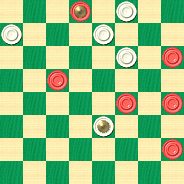
BLACK
Black to Play and Win
B:W30,28,26,22,K10:BK31,21,19,14,13,5.
Black is a man up, but not for long. Still, there is a very nice win on the board. Can you see it? We'd rate this problem as no higher than "intermediate" in difficulty, and we're sure the more experienced players will call it "easy." Whatever it may be, can you solve it? The truly easy thing about it: clicking on Read More will lead you right to the solution.![]()
Temporary Office Closing

Our offices are closed until at least mid-summer; we'll be checking email from time to time but may not be able to respond as quickly as usual to your correspondence. Of course, our Saturday morning publication will continue without interruption, so you can count on a fresh new column every weekend, the same as always. Just look below for our latest article.![]()
Fourth Position

"Fourth Position" as practiced in the art of ballet is obviously very elegant, but appears a little uncomfortable to hold on to for any period of time. The ballerina above carries it out with great grace and skill, but we'll venture a guess that she might be a little tired and sore by the end of class.
Fourth Position, featured today in our ongoing Checker School series, doesn't need to be tiresome; it certainly seems easier to master than, for instance, First Position.
Or is it?
The three variants below show that there may be more here than meets the eye. Subtle changes to the position cause completely different end results. Maybe there's something to this after all!
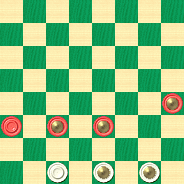
WHITE
Black to Play and Win
B:W30,K31,K32:BK20,21,K22,K23.
BLACK
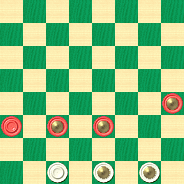
WHITE
White to Play and Draw
W:W30,K31,K32:BK20,21,K22,K23.
BLACK
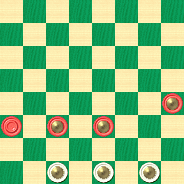
WHITE
Black to Play and Win
B:WK30,K31,K32:BK20,21,K22,K23.
In any event, it's all very practical, as four to three endings of this type come up quite often in cross-board play. Try to work out the solutions and understand why small changes make big differences. Then glide your mouse over to Read More to see the solution, sample games, and detailed explanatory notes.![]()
Priest's Pulverizer

The wicked-looking instrument in the photo above is known as a "Jackson Pulverizer" and when someone is wielding it, perhaps it is best to stand clear.
There are pulverizers in the game of checkers too, as this month's installment from Willie Ryan's Tricks Traps & Shots of the Checkerboard will clearly demonstrate, and they're no less fearsome than the steel variety. Let's see what Willie says about this.
| 10-15 | 23-18 | 8-12 |
| 21-17 | 12-16 | 27-24 |
| 6-10 | 24-20 | 3-8---B |
| 17-13 | 16-19 | 31-27 |
| 1-6 | 25-21---A | 12-16---C |
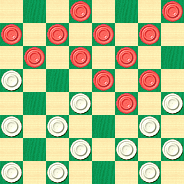
WHITE
White to Play and Win
W:W13,18,20,21,22,24,26,27,28,29,30,32:B2,4,5,6,7,8,9,10,11,15,16,19.
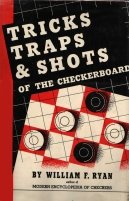
"Now the stage is all set for a ripping cul de sac, which American Champion Matty Priest sprung on James P. Reed in 1878.
A---If white tries 27-24, black goes 10-14, 20-16, 14-23, 24-20, 7-10*, 16-7, 2-11, 31-27, 8-12, 27-18, 19-24, 28-19, 15-24, and white's draw, if any, is problematical.
B---If black presses 10-14, white gets a winning game by 26-23---3.
C---This is where Reed took the wrong road. The following is correct to draw: 9-14, 18-9, 5-14, 22-17, 11-16, 20-11, 7-16, 29-25, 2-7, 24-20, 8-11, 27-23, 15-18, 32-27, 19-24, 28-19, 11-15, 20-2, 15-31, 2-9, 18-27, 9-18, 31-15, 17-14, 10-17, 21-14. James Lees."
3---We're not really sure where Willie was going with this, as the computer definitely thinks this line is drawn. Perhaps over the board it's difficult to play---Ed.
Can you pound your way through this position, or will you get pounded? We think you should give it a smashing good try before clicking your mouse on Read More to see the solution.![]()
Do It Fast but Do It Right

Some things need to be done quickly, but they also need to be done correctly. In the photo above, our high-hurdlers need to be sure to clear the barriers, but they have no time to lose. Needless to say, these two requirements are not always compatible and can cause considerable stress.
This month's speed problem allows for a quick solution, but making a move without a little thought can lead to trouble. So, do it fast, but do it right--- we think 15 seconds is enough time for what seems like a simple 2x2 ending. Click on the link below to display the problem and start the clock. Then come back here and click on Read More to see the solution and notes.
May Speed Problem (not so hard)
![]()
Uncle Ben's Porch
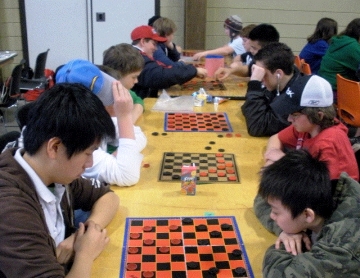
Tommy was doing well this year. Having won a spot on the varsity team in his middle school, he had moved up during the course of the year from fifth board starter--- an entry level position--- to third board starter. And now the Florida State Team Championship Tournament was coming up in just a week.

Tommy visited Uncle Ben nearly every Saturday morning, rain or shine, for his checker lesson from the kindly retired master. But Tommy was extra sure to be up on time and on his way to Uncle Ben's porch this week. He needed to be as sharp as possible for next week's tournament. Not only did he want to do his best for the school team, but how he played would determine his placement for the next school year. And taking over one of the top two slots would be no easy thing.
Uncle Ben knew about the big tournament, of course. He greeted Tommy with a smile and a bit of his usual advice. "You've done very well this year, Tommy, and I know you're wanting to do even better and get one of those higher board slots next year. But you can't think about that during the tournament. You've got to focus on each game and each move, without distracting yourself. You'll move ahead when you're ready, no sooner and no later. Coach Hovmiller will know when it's the right time.
"I've noted that you still seem to be a little impatient with some endgames. Would you agree with that?"
"Yes, sir," replied Tommy, "sometimes I just want to get the game over ..."
"Ah, Tommy, I've seen that. But it's the same thing: the game will be over when it should be, not sooner and not later, and if you try to rush things, you could lose an important couple of points for your team. So today, I want you to look at the position I've set up on the board, and take your time. Even if you think you see how it's done, I want you to spend a full five minutes thinking about all the possibilities."
Tommy agreed, but before he could turn to the board, Uncle Ben smiled and said, "Of course, a glass of lemonade will help your concentration, don't you think?" And having said this, he reached for the lemonade pitcher.

The position Tommy faced was the one shown below.
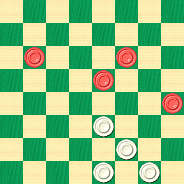
WHITE
White to Play and Win
W:W23,27,31,32:B9,11,15,20.
Tommy thought for a while, and after a couple of minutes started to say, "I've got it--- oh, wait a minute---" and went back to studying the board.
Can you solve this one yourself? Don't go for the first move that comes to mind; be patient and take the full five minutes that Uncle Ben recommends. Then click on Read More to see the solution, a sample game, and 17 additional related problems.![]()
Country Doc
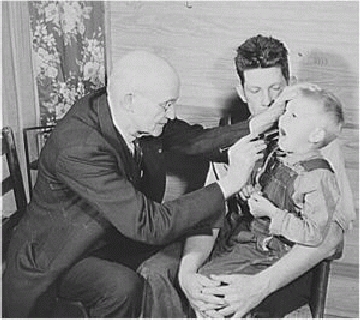
From time to time we feature an article of checker fiction, often an original piece of our own; but once in a while we reprint something that we've come across in an old publication. The following is part essay and part story, and was first published around 75 years ago. As it's now in the public domain, we're running it here for your enjoyment. It may seem a bit long, but it's a delight to read.
THE COUNTRY DOCTOR Devises New Therapeutic System--- Plain Checkers
We live in an age of specialization. All things are built with an eye to quantity of production, or to special excellence of quality. "The specialist" is the cry of the hour.
We had occasion recently to ask an acquaintance what his trade might be. "Mechanic," was the laconic reply. And when we inquired the particular branch of his trade, he confided that he was "Bolt 319 man" at the F--- factory. All day he slips an octagon shaped bolt on a steel rod, pulls it abruptly into position and turns it swiftly with a light hand wrench.
He is a mechanic par excellence. Yesterday there was a leak in the roof trough of his home. Immediately the tinner was called. The kitchen hydrant became frozen on a zero February day. Mechanic "319 bolt" at once summoned the neighborhood plumber. When the hinge on the cellar door works loose, it is the carpenter who is pressed into service. And so on, ad infinitum ... for we live in an age of specialization, and a mechanic is a mechanic a la specialist.
In the treatment of human ills and chills we also find the specialist filling his niche, ready to accept this patient but not the other, a "liver" man but not a "heart" man, or knowing the ways of lung cells but unversed in the pitfalls of digestion. Well nigh every human organ has its following of devoted analysts, diagnosticians and surgeons. The day of the general practitioner is rapidly fading. Even in the smaller cities and villages is seen the enameled or brass sign 'Specialist in ----", following in careful letters the name of the physician. And that old time figure of consolation, the country doctor, well beloved and laden with many cares, with his rig or his Ford and his small leather case--- thermometer, stethoscope, pill and potion--- is gradually drifting away among forgotten presences. In a few more generations he may have become extinct.
There is a lonely village in the northwest corner of the state of Ohio that harbors a general practitioner of the species known as the Country Doctor. He is the village physician, but since the greater number of his calls are made at farm homes within a radius of from five to ten miles, the more fitting name is given him by his city friends. Also he is known variously as the C. J. R., the collector of art treasures, and the Rajah. These are titles imposed upon him by his friends. The C. J. R. is adapted from some obscure passage of Omar, the exact meaning of which has never been revealed. It has the suggestion of some far-away Genie emerging from an Arabian garden, for he is also a lover of plant life. The Rajah is meant to typify an insular imperialism and was bestowed upon the kindly doctor by an acquaintance who came out of the Orient, and found among rare prints and books in his study the memory of an olden ruler, whose authority was unspoken and whose influence was spread about through his power of humanizing abstract and fearful philosophies. Besides, when you come to think about it, a country doctor has a unique position of authority. He is removed from the public glare; his word about the condition or treatment of his patient is law, and he can err fatally or achieve miracles and little will be heard in one case or another beyond the rural circle of his practice. Rajah, then, is one of the surnames of this country doctor.
But what we are getting to is that he is a Rajah of Checkers more than anything else. Quiet, unassuming, a sly humor trickling out for occasion, he has two checker boards ready for play at any hour of the day. One board is kept in his anteroom, one in his examination room. Patients who come to him are usually invited to a game, if no other callers are waiting. He draws slowly at his mild Havana as he meditates his moves. And with each move lie lifts his eyes to observe the effect upon his patient. Often he studies his patients to better advantage over the checkerboard, when they are relaxed and away from the thought of their ailment, than when tapping and sounding them as to their symptoms.
And there are times when he carries a checkerboard with him on his rounds to the sick. For him, the game is a help in diverting the minds of the ailing. Unable to concentrate upon books, his patients often become occupied and even absorbed in the combinations on the board. The doctor plays a strong game and succeeds in winning most of the time, but there are games when he goes down to unexpected defeat, following a sudden lapse of form, due perhaps to a habit of occupying his mind with his patient.
Checker therapeutics is probably an amusing fancy of this country doctor, yet he has accomplished seeming wonders in the treatment of many of his patients, some of them chronic sufferers for years. And they are grateful to him, and come not always to talk of their infirmities, or to pay their bills, but to "let's see what we can do in a game today, doctor."
There are busy periods in the winter months when the checkerboards are not opened for many days, when this kindly, rustic physician is in demand every hour, when the telephone rings on blizzard swept nights and alone over the dark roads he must drive to some house of pain. He knows the people of this community, knows their hearts, and knows, too, their fighting strength, in life and over the board alike. He has seen them tested in both games. To them he is a pillar of support and comfort in time of need. They feel his helping urge. They do not always understand him, but they recognize kindness and assurance in his words.
"There are some games one just can't win", said the country doctor to the writer one day, a little sadly, "some situations that have advanced too far to recover from, but it's really surprising how many apparently lost games can be pulled out into the clear. I've seen them--- I've seen them right . . . well, right over this board."
He drew at his Havana thoughtfully and studied the combination we had developed in our game. Here is a diagram of it:
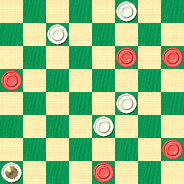
BLACK
Black to Play and Draw(?)
B:W30,27,14,10,K4:B22,21,20,5,2.
I was ready to concede a loss. But his remark suddenly aroused me to thought, and almost in a flash I caught sight of a chance for a break from Square 21 to 25. I viewed the situation for a half minute and then went boldly into my plan. True enough, it was a success. The doctor followed with 30-21, and I went on from 22 to 26. From then on it was 27-23, 26-31, 23-19, 31-27, 4-8, 27-24, 19-15, 24-19, 8-4, 19-23, 15-11, 23-18, and I found I had retrieved my game and earned a comfortable draw. His easy comment had saved me.
On one of my visits to the country I found the Rajah in a close game with a patient whom he introduced to me as Mr. V----. Later the doctor remarked that his patient was a very nervous subject. "He comes with his head full of dreads, and his heart beating like a trip-hammer. Not much wrong with him though. And somehow he soothes down after a game or two of checkers. Of course, 1 forget some of my moves and he gets me into tight situations. Wins this one, loses the next. Generally has the edge on me. It's remarkable how he forgets his nerves as we play. I've watched him for the past three weeks. Comes in every day for a game or two. And he's improving--- improving."
That's the Checker Rajah--- the country doctor. A man of quiet reveries, of affection for the slight things in life, understood by few, loved by many, and a sustaining force in his community.
Over his door one might well write, "Specialist in--- Checkers."
Editor's Note: This is a great story and a great endgame, but unfortunately it's flawed. In the days before powerful computers, sometimes deep endgame subtleties were overlooked. Though it's anything but easy, can you correct White's play and find the win? In other words, can you cure this position, or will it give you a headache?
Don't get worried sick over it; healing is at hand by clicking your mouse on Read More to see what the KingsRow engine has to say.![]()
Three Bridges

Judging by the photo above, the train is about to pull in to Three Bridges Station, and if we want to get to Chichester, we'd better get on board.
Today's entry in our Checker School series is also about three bridges, and about getting on board with their solutions if we want to ride the train to checker success. The three related bridge positions shown below are taken from Ben Boland's Famous Positions in the Game of Checkers, and knowing how to handle this very common ending type is vitally necessary, as bridge positions arise all the time in practical play. The settings are attributed to old-time players Thirkell, Keenan, and McHardy.
BLACK
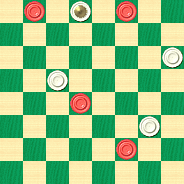
WHITE
White to Play and Draw
W:WK2,12,14,24:B1,3,18,27.
J. G. KEENAN
BLACK
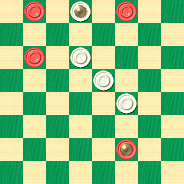
WHITE
Black Plays, White Draws
B:WK2,10,15,19:B1,3,9,K27.
A. McHARDY
BLACK
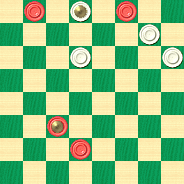
WHITE
White to Play and Draw
W:WK2,8,10,12:B1,3,K22,26.
Bridge positions can be tough to defend, and the ones above require both care and technique. Can you bridge the gap and find the drawing moves? Work out the answers and then move your mouse across the bridge to Read More to see the solutions, sample games, and detailed notes.![]()
A Bump in the Road

We get our title for today's Checker School installment from the look of the problem position.
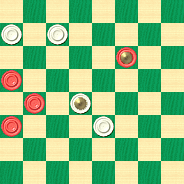
BLACK
Black to Play and Draw
B:W28,27,K15,10:BK22,20,16,12.
Black's little "bump" of three men off on the left side of the board is a formation that spells trouble, because it has no mobility, and mobility is what checkers is all about. But this bump in the road, though it's kind of a rough one, won't cause a wreck--- if you know how to handle it. There's a draw here for Black; can you find it?
Don't let this problem bump you off; solve it and then give your mouse a bump on Read More to see the solution, a sample game, and complete notes.![]()
The Checker Maven is produced at editorial offices in Honolulu, Hawai`i, as a completely non-commercial public service from which no profit is obtained or sought. Original material is Copyright © 2004-2025 Avi Gobbler Publishing. Other material is public domain, as attributed, or licensed under Creative Commons. Information presented on this site is offered as-is, at no cost, and bears no express or implied warranty as to accuracy or usability. You agree that you use such information entirely at your own risk. No liabilities of any kind under any legal theory whatsoever are accepted. The Checker Maven is dedicated to the memory of Mr. Bob Newell, Sr.

